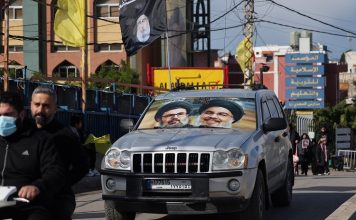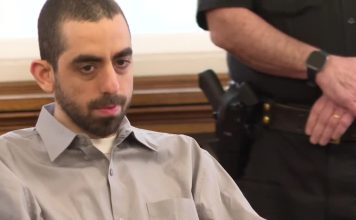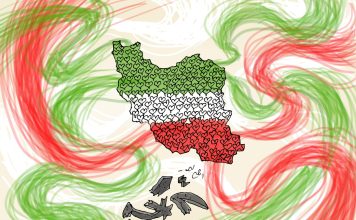Iran ranked 177th out of 180 countries for press freedom, followed by Vietnam, China and North Korea, according to a new index published on May 3 by Reporters Without Borders (RSF).
An additional document, which offered a breakdown of the index, held that restrictions on press freedom around the world were at their worst since the index started 21 years ago.
[aesop_image img=”https://kayhanlife.com/wp-content/uploads/2023/05/Country-ranking-RSF-index-2023-CONFIDENTIAL_001.png” panorama=”off” credit=”Country ranking – RSF index 2023 ” align=”center” lightbox=”on” captionsrc=”custom” captionposition=”left” revealfx=”off” overlay_revealfx=”off”]
[aesop_image img=”https://kayhanlife.com/wp-content/uploads/2023/05/CARTE_2023-EN-2_001.png” panorama=”off” credit=”KL./” align=”center” lightbox=”on” captionsrc=”custom” captionposition=”left” revealfx=”off” overlay_revealfx=”off”]
Journalists and media outlets inside and outside Iran are routinely targeted by the government, which human rights organizations say is a tactic to quash dissent.
Iran moved up one place on the index, having ranked 178th out of 180 in 2022. However, the country remained in RSF’s “very serious” category, which included 17 percent of the countries on the index. Rankings are made up of individual scores given to the overall state of each country’s political, economic, legal, social and security frameworks.
Laws in Iran give Supreme Leader Ayatollah Ali Khamenei the power to order the arrests of journalists, hand down long prison sentences, and impose the death penalty.
RSF said the Iranian regime’s brutal crackdown on anti-government protests sparked in September by the death of 22-year-old Kurdish-Iranian Jina Mahsa Amini while in police custody, “drove the country’s ‘social context’ and ‘judicial environment’ scores even lower.”
Iran Executed More Women in 2022 Than Any Other Country, Report Says
RSF added that while freedom of expression in Iran had historically been repressed, the harassment and interrogation of journalists had become significantly worse since the protests began. The report held that more than 70 journalists were arrested, “as the authorities stopped at nothing in their efforts to prevent coverage of the protests.”
The annual report was launched at a May 3 event at private members’ club the Royal Over-Seas League in London, to mark World Press Freedom day.
The panel for the launch event included: Fiona O’Brien, RSF Bureau Director for the UK; Rana Rahimpour, a journalist and former lead presenter at the BBC World Service; Kim Sengupta, the world affairs editor for the Independent; and Howard Zhang, the editor for BBC Chinese. The conference was chaired by Deborah Bonetti, the director of the Foreign Press Association in London.
[aesop_image img=”https://kayhanlife.com/wp-content/uploads/2023/05/IMG_9347-e1683182709733.jpg” panorama=”off” credit=”The panel for RSF’s 2023 index launch event” align=”center” lightbox=”on” captionsrc=”custom” captionposition=”left” revealfx=”off” overlay_revealfx=”off”]
Answering a question from Kayhan Life about the reason for Iran rising one place in the 2023 ranking, O’Brien said, “It’s only a small rise, and part of the reason for this rise is to do with the rise and fall of the countries in the index. If you look at the different elements, the two that have gone up slightly are the political situation and economic stability.
“Things that feed into that is the tally of how many people have been arrested. If you’ve already arrested journalists it can affect things like security, because there aren’t any journalists reporting on the ground, but [Iran] is absolutely still in the bottom section. It is one of our biggest countries of concern,” O’Brien added.
Speaking about her personal experience of being targeted by Iran’s government, Rahimpour said, “I was very involved in covering the protests. I then found out through a data analyst that I had been the target of over half a million [online] attacks, including death threats, rape threats, you name it, it was out there.” Rahimpour also described incidents where her phone was tapped by Iranian agents, and her car was broken into in London.
Offering a review of the last 8 months in Iran, Rahimpour said that many of the journalists arrested for covering the demonstrations were women: “They [have faced] arbitrary arrest, they have been imprisoned, interrogated, their families come under threat, but they continue.”
The United Nations acknowledged the bravery of several Iranian journalists on May 2 by awarding them the UN Press Freedom prize. The award was given to Niloufar Hamedi, Elahe Mohammadi and Narges Mohammadi.
[aesop_image img=”https://kayhanlife.com/wp-content/uploads/2023/05/IMG_9350-e1683182744875.jpg” panorama=”off” credit=” Journalist Rana Rahimpour holds up a photo of detained female journalists Niloufar Hamedi and Elahe Mohammadi” align=”center” lightbox=”on” captionsrc=”custom” captionposition=”left” revealfx=”off” overlay_revealfx=”off”]
Hamedi and Mohammadi broke the story of Amini’s arrest and her death while in detention. The two women were subsequently charged with colluding with the intention of “acting against national security” and “propaganda against the state” on Nov. 8, and of being US intelligence agents. They were placed in prison though no updates about their cases or their wellbeing have been released.
Narges Mohammadi, the co-director of the Tehran-based civil society organization Defenders of Human Rights Center (DHRC), is currently serving a 16-year prison sentence in Evin prison.
Iran officials have repeatedly alleged that western states are behind the protests and negative media coverage of the government.
A journalist working in Iran who asked to speak on condition of anonymity told Kayhan London: “The working conditions inside are very difficult, and at any moment those who try to remain committed to independent reporting could be arrested.”
Another journalist working at an international TV channel, who also asked not to be named, described the increasing pressure on his family in Iran: “They summoned my father twice in the last six months and threatened him each time ‘if he did not stop my cooperating with this media.’ They can arrest him or ask the company where he works to fire him for cooperating with opposition movements.”
“In the past, they gave warnings by phone from time to time, but now they summon [people] and the threats are much more serious,” they added.
Journalist Kayvan Samimi was arrested in Iran on April 20, and taken to an undisclosed location following his involvement with a meeting on social media app Clubhouse which appeared to call for a new political system to replace the Islamic Republic. Samimi was accused of having “connections with hostile anti-state groups in exile,” by Iranian authorities. He was previously arrested in December 2020 for “plotting against national security,” and served three years in prison. He was released in January prior to his second arrest.
Sazandegi, a reformist newspaper in Tehran, was shut down on Feb. 20 by the government after the Press Supervisory Board accused the outlet of several violations, including publishing “false content” and “disturbing public opinion.” The paper was critical of Iranian officials and regularly criticized their handling of the country’s economic crisis, and their clampdowns on the compulsory hijab.
Mehdi Beik, a journalist and the political editor for the moderate newspaper Etemad who interviewed the families of protesters who were sentenced to death, was detained on Jan. 5 by security officials. The reason for his detention is unknown.
Concerns about the regime’s ability to target Iran journalists on foreign soil have grown in recent years.
Saudi-backed media outlet Iran International was forced to close most of its operations in London amid growing threats deemed credible by Britain’s police force, against its journalists. The General Secretary for the National Union of Journalists (NUJ) Michelle Stanistreet called on the UK government to act swiftly and said, “As the domestic pressures have ramped up in Iran, so has that regime’s interest in closing down the scrutiny and attention that independent journalism and reporting brings,” in a Feb. 23 press release.
Reporter and human rights activist Masih Alinejad was the target of an alleged assassination plot in 2022 by a group linked to Iran’s government. The US foiled the plot and arrested three men in connection with the charges. Two of the men appeared in court on Feb. 1 accused of several offenses included murder for hire and conspiracy to commit murder for hire. Alinejad was also the target of an alleged kidnapping plot in 2021, which led to the arrest of a different group of men with ties to Iran’s government.







